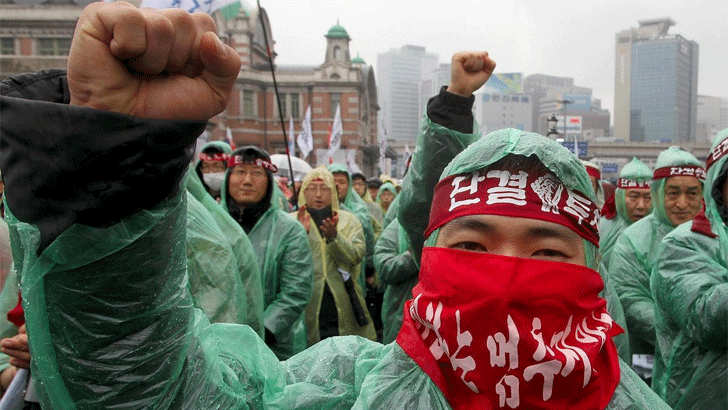Korean railway strike: what’s at stake?

On 31 December, thousands of Korean railway workers returned to work after a three-week strike against government plans to set up a subsidiary company to operate a Korean Train express (KTX) service in competition with the state run Korail.
It was the longest railway strike in South Korean history.
Korail management and the right wing administration of President Park Geun-hye cracked down on the strike. Arrest warrants were issued for the leaders of the Korean Railway Workers Union (KRWU) and almost 8,000 workers had their positions suspended or terminated. On 17 December, police raided KRWU headquarters and confiscated computers and documents.
Five days later, 6,000 riot police raided the Seoul headquarters of the Korean Confederation of Trade Unions. Officers smashed their way through the building with tear gas, water cannons and oxygen removal machines. The siege lasted more than 12 hours. Despite more than 130 people being arrested, the police were unable to locate the wanted KRWU officials.
The strike ended after the government agreed to set up a parliamentary committee to discuss the issues that led to the strike. The leaders of the KRWU are now in jail awaiting sentencing and the government is refusing to drop its plans to set up the subsidiary KTX operator. Korail management also is refusing to drop disciplinary action against workers. The company is pursuing the union for more than $4.6 million in damages.
The government knows that outright privatisation is unpopular. Instead it is cutting off a large chunk of Korail’s revenue by splitting its most profitable operation in half. The KTX line between Suseo Gangnam in Seoul and Pyeongtaek (60km south) is Korail’s busiest and most profitable line. With Korail’s main revenue earner depleted the government can allow Korail to snowball further into debt and use this as a justification to sell public assets at dirt cheap prices.
The government claims that “reform” is needed in order to make the rail system more efficient. It is blaming unions for demanding “unreasonable” wages. Right wing newspapers are running bogus stories claiming the average Korail employee earns more than A$60,000 a year. This “average wage” includes all persons employed by the company, including middle and senior management.
Those involved in the strike were from the lower end of the pay scale. Some workers, such as ticketing agents, are earning as little as $28,000 per year - even after 15 years of service. Since 2005, more than 10 percent of Korail’s workforce has been made redundant and the average wage has actually fallen.
The bulk of Korail’s debt is due to management’s decision to invest in a failed real estate megaproject called the Yongsan International Business Zone. The $31 billion project involved some of South Korea’s largest corporate conglomerates known as the “Chaebol”. The plan was to develop a Dubai-inspired business hub for the mega-rich, with the promise of reviving South Korea’s economic glory days of the 70s and 80s.
The global economic crisis of 2008 hit the project hard. In 2013, Korea’s real estate bubble burst and the entire project had to be abandoned. Thousands of working class people were forcibly evicted and had their homes demolished for the project. Now that the project has failed, workers and the public are to bear the brunt of management’s mistakes.
A lot is at stake in this struggle. The failure of private railway experiments in the UK, Japan and Australia demonstrate that rail privatisation results in the pilfering of public money by corporations. If the government gets its way, it will cut more jobs and smash the KRWU and attack wages across the board. But the KRWU is a proud union with a history of struggle. Militant unionism has won major gains in pay and conditions for railway workers. The fight is not yet over.